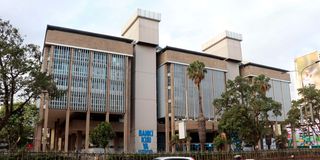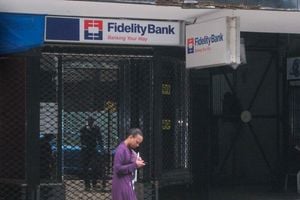
The court battle between Sultan Khimji and SBM Bank has thrust the Central Bank of Kenya and its former Governor Patrick Njoroge into the eye of a storm. PHOTOS | FILE | NATION MEDIA GROUP
On November 16, 2016, tension broke out during negotiations between Fidelity Bank and Mauritian SBM Bank, which was seeking to take over the Kenyan lender.
Previous talks had placed Fidelity Bank’s value at Sh1.3 billion, which would have seen the lender’s owners pocket a tidy sum in initial payments pending SBM’s takeover.
The initial talks had seen SBM propose further payments after recovery of bad loans, but on November 16, SBM had changed its tune and claimed that Fidelity Bank was worth Sh1 billion.

Fidelity Bank branch on Nairobi’s Kaunda Street in this photo taken in 2013.
The Mauritians had proposed injecting Sh700 million to cater for bad loans, and Sh300 million into legal costs associated with recovery of defaulted loans.
This meant that Fidelity Bank’s owners would get nothing in initial payments, but were promised a maximum of Sh600 million in deferred payments depending on how the bad loan recovery process would turn out. Fidelity Bank’s shareholders walked off.
Billionaire Sultan Khimji founded the lender in 1992 as Fidelity Finance Ltd. The CBK granted the company a commercial banking operation licence in 1996, which saw it rebounded as Fidelity Commercial Bank Ltd.
Fidelity Bank had not posted a detailed shareholding structure on its website before the SBM Bank acquisition, but past declarations with industry regulators and watchdogs indicate that the Khimji family held a majority stake.
Khimji, who at the time was managing director, now claims in court that the Central Bank of Kenya, CBK, engineered the Fidelity Bank sale after denying the lender financial support.
Mr Khimji, who is seeking over Sh2 billion from the CBK and SBM Bank, claims that on the night of November 16, former CBK Governor Patrick Njoroge called him in a bid to push through.

In this photo taken on July 11, 2013, Sultan Khimji, the executive director of Fidelity Commercial Bank. FILE PHOTO | EMMA NZIOKA | NATION MEDIA GROUP
After the initial negotiations in October 2016, SBM indicated that it could buy Fidelity Bank for Sh1.3 billion, but the Mauritians allegedly intimated that Fidelity was a “small bank” and its acquisition would not offer an entry into Kenya as grand as had been envisioned.
To get SBM back to the negotiating table, Mr Khimji claims, the CBK proposed that the Mauritians buy Fidelity for just $1 (Sh100 at the time).
As it is, Fidelity Bank’s sale has gone down in Kenya’s corporate history as the lender that was sold for just Sh100. Mr Khimji claims in court that shareholders were coerced and tricked into the deal.
“…This proposal would therefore deliberately restructure the value of the bank to zero. The Fidelity Bank team rejected the proposal by SBM and they (SBM) agreed to return the following day with a counterproposal,” Mr Khimji says in court papers.

SBM Bank's Mama Ngina Street branch in Nairobi.
"However, on the night of November 16, 2016, I was contacted by the CBK governor and he implored me to convince the members of the board to look at the transaction positively as “it was for the good of the banking sector and the country."
The CBK has denied having any role in the sale deal, save for granting approvals as the industry regulator.
SBM Bank on its part insists that there was no foul play, and that all 44 Fidelity Bank shareholders willingly entered into the Sh100 sale deal after getting sound legal advice from some of the region’s top minds in commercial law.
The court battle has thrust CBK into the eye of a storm, as former Fidelity Bank owners claim it refused to offer financial support to the Kenyan lender, only to give interest-free loans to SBM shortly after the sale had gone through.
After Chase Bank became the third Kenyan bank to collapse in a span of eight months, the sector was shaken to its core.
The CBK had already shut down Dubai Bank and Imperial Bank in 2015.

Former Central Bank of Kenya Governor Patrick Njoroge. He was appointed on June 19, 2015 and exited in June 2023.
With all three lenders, the CBK hinted at mismanagement and some aspect of fraud by owners or directors.
Ramifications were almost instant, as some banks recorded less customer deposits, and massive attempts by customers to withdraw their savings.
In 2016 and 2017, some lenders attributed reduced deposits to customer panic on account of the bank collapses as they made public their profit and loss statements.
Fidelity Bank, much like some of its competitors, was facing several withdrawal requests from customers.
And much like some competitors, a bank run was knocking on Fidelity Bank’s doors.
There was only one option left for Fidelity Bank – dust off its begging bowl and approach the CBK, the lender of last resort.
Part of the CBK’s regulation role entails lending to banks it oversees if the move will avert a collapse that could expose depositors and creditors to astronomical losses.

The Central Bank of Kenya headquarters in Nairobi.
The CBK insisted on Fidelity Bank providing security of at least Sh700 million for the borrowings.
Fidelity Bank’s former owners now say in court that this was the first of many red flags in the run-up to allegedly being tricked to sell their business for Sh100.
“Fidelity Bank was hit hard by the effects of the bank runs and it was unable to sustain the rate of decline in its depositors, and CBK was approached as the lender of last resort as it is believed to have the mandate to support banks and foster the stability of the banking sector,” Sultan Khimji, who is suing on behalf of the lender’s former shareholders, says in court papers.

SBM Holdings Limited chairman Kee Chong Li Kwong Wing (left) with Dr Njoroge during the official handover of acquired assets of Chase Bank Kenya Limited (In-Receivership) from the CBK and the Kenya Deposit Insurance Corporation to SBM Kenya Ltd on August 20, 2018. PHOTO | FILE | NATION MEDIA GROUP
“Instead of receiving direct liquidity support, Fidelity Bank was asked by CBK to collateralise its support line, and that its board was to provide two properties worth Sh700 million in order to obtain funding,” Mr Khimji adds.
The CBK has since claimed in court that the closure of Imperial and Chase banks had a minimal effect on deposits, despite some industry players attributing reduced savings by clients on the closures.
Series of meetings
Mr Khimji, a former Fidelity Bank executive director, claims that a series of meetings were held as the two sides haggled over terms and conditions of the forthcoming support.
In one of the meetings, the CBK changed tune, and instead played the role of a broker, as it insisted that Fidelity Bank’s directors speak to an undisclosed consultancy firm with the aim of selling a majority of the business to a new investor.
The regulator allegedly used underhand tactics, including threatening to deny Fidelity Bank operation licences.

Mr George Odete, the SBM Bank Director in charge of Legal Affairs, and the Company Secretary. PHOTO | COURTESY | SBM BANK
The regulator, Mr Khimji adds, also intimated that Fidelity would share the same fate that had befallen Imperial Bank and Chase Bank if directors did not toe the line and push through the sale to SBM.
The CBK has, in its defence papers, denied all allegations of applying pressure or being part of the sale process, save for being involved in its capacity as industry regulator.
The regulator has further denied issuing an interest-free Sh4 billion loan to SBM Bank Kenya, but does not give specifics of the denial.
SBM Bank’s Company Secretary George Odete insists that Fidelity Bank’s liquidity troubles were a result of mismanagement, and that the former shareholders should not be allowed to benefit from their own failures.
Mr Odete argues that Mr Khimji was Fidelity Bank’s managing director for several years, and faults the career banker for allegedly causing the liquidity issues.

An artist rebrands Chase Bank’s Moi avenue branch in Mombasa to SBM Bank on August 26, 2018 after the former’s acquisition. PHOTO | WACHIRA MWANGI | NATION MEDIA GROUP
“Should the application (Mr Khimji’s) be granted, the applicant stands to benefit from his own misconduct in mismanaging the bank and placing the bank in a negative liquidity position in the first place, necessitating the first respondent’s (SBM Africa Holdings) in the bank, and thereafter causing losses on the part of SBM Africa Holdings for seeking to remedy the applicant’s own misconduct,” Mr Odete says in court papers.
In court papers seen by the Nation, SBM Bank has not denied applying for, or receiving, liquidity support from the CBK.
Up for sale
At the time Fidelity Bank was up for sale, the CBK had stopped the issuance of new banking licences, and the only way for a new entrant in the industry was through the purchase of an existing, preferably struggling, lender.
In share purchase agreements, SBM indicated that it would inject at least Sh1.4 billion into Fidelity Bank after the takeover, but after buying the bank for just Sh100, SBM, did exactly what Fidelity’s former directors had tried to do – the Mauritians dusted off their begging bowl and camped at the CBK’s door seeking liquidity support.
Mr Khimji alleges in court papers that the CBK issued a Sh4 billion interest-free loan to SBM, which was aimed at keeping Fidelity Bank afloat.
“The first and third defendants (SBM Holdings and SBM Africa Holdings) failed to invest the promised funding and instead asked the second defendant (CBK) for funding of Sh4 billion, which constituted liquidity support that the second defendant had failed to avail to the bank sellers previously despite request. The second defendant gave the liquidity support at concessionary interest for a substantial period after failing to support the bank sellers, despite being the lender of last resort,” Mr Khimji says.
Bad loans
SBM says it has since discovered that the bad loans it inherited were worse than advertised.
When taking over, SBM claimed that liquidity challenges dragged Fidelity Bank’s value to Sh400. The amount, SBM says in court papers, is actually more than Sh1.6 billion.
In July, Justice Alfred Mabeya issued orders barring SBM Holdings Ltd from selling its Kenyan business and exiting the industry pending determination of the suit.
But SBM Bank Holdings now says it was wrongly listed in the case, as it is merely a Mauritian company that owns shares in SBM Bank (Kenya) Ltd.
Parties' list
SBM Bank Holdings argues that it is unable to abide by the orders, as it is not the entity operating the bank.
Mr Khimji has filed an application seeking to amend the parties list, by adding SBM Holdings Ltd and SBM Africa Holdings Ltd, arguing that he has since discovered that they are the correct parties.
SBM Bank Holdings argues that even if the new parties are brought into the case, the orders Justice Mabeya issued in July cannot automatically apply to them.
SBM Bank Holdings has also challenged Justice Mabeya’s ruling at the Court of Appeal.






